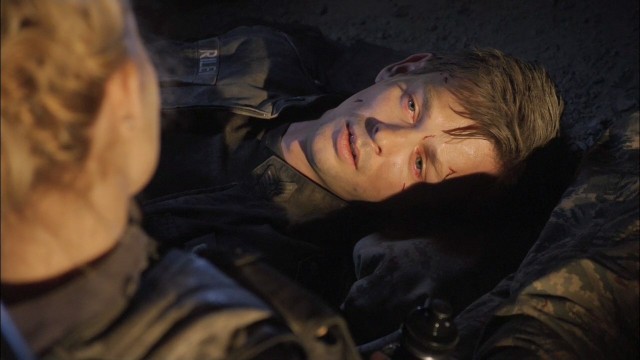
STARGATE UNIVERSE - SEASON TWO
EPISODE NUMBER - 202
Dr. Rush directs a shuttle to a planet inaccessible by Stargate -- but a crash landing threatens to strand those on board. Meanwhile, Rush makes a stunning discovery on Destiny, and Young must decide what to do with his prisoners.
VISIT THE EPISODE GUIDE >>
GATEWORLD FAN REVIEWS
Calling All Writers! Tell the world what you think of the newest episodes of Stargate Universe! We want you to share your thoughtful and well-reasoned evaluation of episodes. But we do have some guidelines, so please read carefully before submitting your review.
This thread does not function like normal threads at GateWorld! Read this post carefully.
Fan Review threads are not for conversation, even if it is discussing a member's review. For that, please use the official GateWorld episode discussion threads in this folder, or start a new thread. All posts to this thread that are conversational will be immediately deleted.
Fan Review threads are strictly reserved for formal reviews, which are deemed by the moderators to meet the following four guidelines:
- (1) LENGTH. Your review must be a minimum of 400 words and a maximum of 1,000 words.
(2) FORMALITY. Your review should be in a formal prose style (not informal and conversational, as regular forum posts are), following the Introduction - Body - Conclusion form. (The best reviews will include a single, encapsulated statement evaluating the overall episode that is stated in the introduction, defended in the body, and restated in the conclusion.)
(3) EDITORIALIZING. This piece is about your opinion of this specific episode. Do not summarize scenes or plot points, and generally avoid objective analysis of developments in story arcs, characters, etc. Assume that your readers have seen the episode you are discussing. Your review should give your opinion of various aspects of the episode (see below), not simply inform.
Beyond this, your ultimate goal is to challenge readers to think about the episode in a way they may not have when they first saw it. Avoid phrases like "I liked" and "I didn't like." Don't merely state what you thought -- defend it with examples.
Aspects of the episode that you might want to include in your review are (you do not need to cover every item on this list!):
- Story
Character use
Dialogue
Writing
Acting
Directing
Guest casting
Music / score
Visual effects
Editing
Costumes & makeup
Overall production value
Contribution to story arcs / overall series
(4) FAIRNESS. Very few episodes that you dislike are without a few saving graces, just as very few episodes that you love are completely without flaw. Avoid unqualified gushing on the one hand, or unbalanced negativism on the other. Personal attacks on the show's cast or crew are strictly forbidden.
By posting a reply to this thread, you are submitting a Fan Review for publication here on the forum! (Questions or concerns can be directed to the moderators via Private Message or the "Ask the Moderators" thread; do not post them here.) All reviews that are deemed to sufficiently meet the guidelines above will be approved and published in this thread, regardless of the author or the opinions contained. Reviews will not be edited for content. If your review is not approved within 48 hours, please consider rewriting it (and perhaps having someone beta read it for you) and submitting it again.
By submitting a review, you agree and grant permission for it to remain published here (nonexclusively). You also grant GateWorld nonexclusive rights to edit your review and republish it elsewhere on the site, with your byline intact (as provided in the body of your review, or if none, your GateWorld Forum username at the time of republishing). GateWorld's editors reserve the right to revise these guidelines in the future.
Thanks!
All reviews are the opinion of the author
and not necessarily that of GateWorld.net and its owner.
and not necessarily that of GateWorld.net and its owner.


Comment